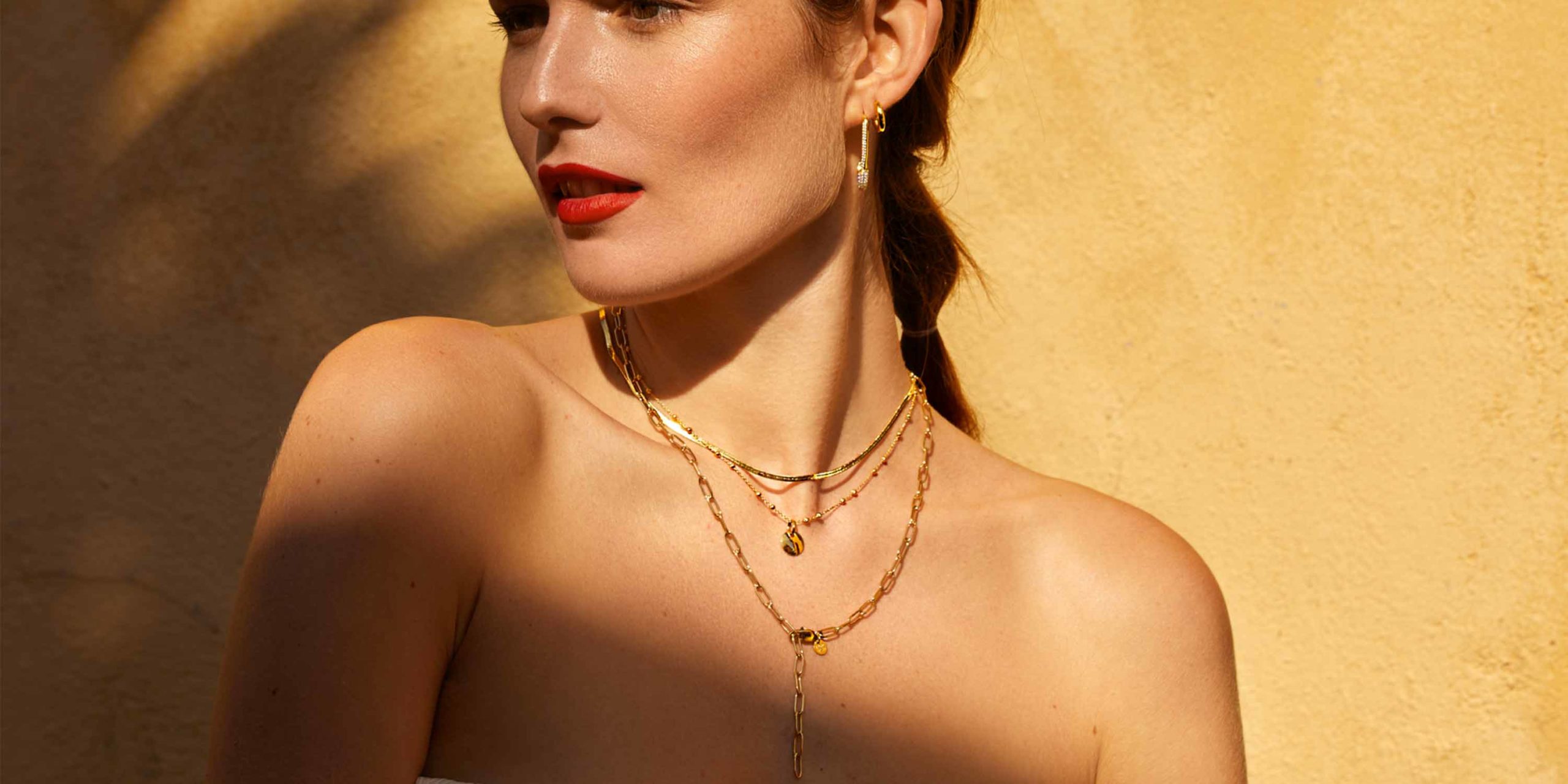
Jewellery care guide
To enjoy your new favourite pieces of jewellery for a long time, it is important to care for them regularly. Here you can learn how to give your jewellery the care it deserves.
Cleaning jewellery
Do you wear your jewellery regularly for different activities and also leave it on when you sleep? Then it can get a little dirty from sweat, cosmetics and other things from time to time. To maintain the beauty of your jewellery for as long as possible, you should clean your jewellery, preferably on a regular basis.
The best way to clean your gold chain, your earrings or your rings depends on the material. However, the following always applies: treat your jewellery as gently as possible, take it off during sports and sleep and do not let it come into contact with cleaning agents and cosmetics. That way, your jewellery will stay shiny and beautiful for a long time.
Why does jewellery tarnish or become dull?
The "tarnishing" of the material is basically nothing more than a chemical reaction: oxidation (aka reaction with oxygen). This causes the dark patina to form on silver and the shine to be lost on gold. By rhodium-plating our silver jewellery, i.e. by additionally coating the material, tarnishing is delayed. But don't worry: oxidation cannot be completely prevented, but at least it can be removed with proper care and also by careful cleaning.
By the way, stainless steel jewellery does not tarnish, its colour does not change even after regular contact with water. This also applies to gold-plated stainless steel jewellery, which does not lose its gold-plating over time. Here you can find more information about our jewellery materials
General tips and tricks
Your favourite jewellery is confronted with all kinds of "dangers" in everyday life. That's why there are a few points you should keep in mind when caring for and storing it:
-
- Hydrophobicity. In principle, gold-plated jewellery lasts longer if you don't expose it to too much water. Can't do without your jewellery when showering and swimming? Then go for stainless steel jewellery or a non-gold-plated version.
-
- Safe and Sound. In a closed jewelry box your favorite necklaces, earrings and co. feel comfortable, because here they are protected from moisture and too much oxygen. You can find more tips in our guide to jewelry storage.
Which material should be cared for and how?
The right cleaning depends on the materials of the jewellery. Jewellery materials are like skin types: each needs special care that suits its needs. This is how you give your jewellery the care it deserves:
-
- Stainless steel: As 316 L stainless steel neither rusts nor tarnishes, you usually only need to polish it with a soft cloth to give it back its shine. If the stainless steel jewellery does get dirty, you can simply clean it with lukewarm water, a little soap or washing-up liquid and a soft toothbrush.
- 925 sterling silver: You can make tarnished silver shine again either with a silver polishing cloth or a bath of lukewarm water, salt and a strip of aluminium foil. If the oxidation is particularly strong, you can clean it with a silver bath from the drugstore or jeweller.
- 18K gold: 18K real gold is a very resistant and durable material that is particularly suitable for everyday wear. That is why real gold has always been very popular for jewellery making. Moreover, gold is extremely easy to care for because, unlike silver, it does not oxidise and can also withstand contact with water without any problems. Only if you want to swim in chlorinated water, you should definitely take off your gold jewellery, as chlorine can discolour gold. Polish your gold jewellery with a soft cloth from time to time to make it shine again. If your jewellery is very dirty, you can use lukewarm water with a little mild soap. Just be careful not to be too aggressive and always dry your real gold jewellery well after cleaning.
-
- Gold plating: For yellow gold or rose gold plated jewellery, cleaning should not be too aggressive, as the gold plating can peel off sterling silver over time. Lukewarm water, a mild soap and a soft cloth are usually sufficient for care. Above all, make sure to dry your jewellery carefully and gently.
-
- Semi-precious stones: You should always be careful with semi-precious stones. Although it is a hard material, it is also more susceptible to scratches and cracks. For necklaces, bracelets, earrings etc. with gemstones, lukewarm water, a little mild soap and a soft toothbrush can be used for cleaning. Then dry thoroughly with a soft cloth. The same applies to freshwater pearls, but these can also be air-dried.
Trust is good, control is better!
Cleaning jewellery is also a good opportunity to check the material and the gemstones and pearls. Semi-precious stones should be checked for major scratches and cracks . For set or glued gemstones and pearls, you should also check that they are still firmly in the setting.
You should check the finish of jewellery without stones. Shiny jewellery becomes duller over time and matt jewellery becomes shinier. You can restore lost shine by polishing with a soft cloth, and you can give your favourite pieces an edgy matte look again with a special matting sponge. Simply sweep the surface in the desired direction to make it beautifully matt again.

